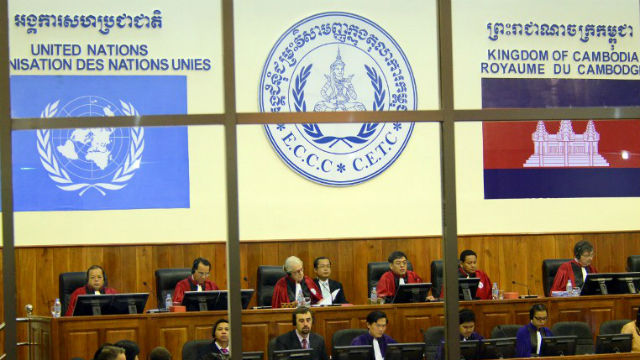SUMMARY
This is AI generated summarization, which may have errors. For context, always refer to the full article.

PHNOM PENH, Cambodia – Some 100 staff at Cambodia’s war crimes court for former Khmer Rouge leaders went on strike over unpaid wages on Sunday in a fresh blow to the UN-backed body.
The tribunal’s 250 Cambodian workers, including judges and prosecutors, have not been paid since June, amid cash shortages and delays that caused United Nations Secretary-General Ban Ki-moon on Wednesday, August 28, to appeal for international donors to step in.
Tribunal spokesman Neth Pheaktra told AFP that staff had officially confirmed they would not return to work until the salary issue was solved.
“If translators, interpreters, and other sections do not work, it means that the work of the court will be stalled,” he said.
The tribunal has been frequently short of cash since it was set up in 2006 to push for justice for the deaths of up to two million people under the fanatical communist regime in the late 1970s.
Two defendants — Khmer Rouge “Brother Number Two” Nuon Chea, 87, and former head of state Khieu Samphan, 82, — are currently on trial for their roles in the regime.
Both deny charges of war crimes, genocide and crimes against humanity.
Heather Ryan, a trial monitor at the Open Society Justice Initiative, told AFP the strike could be “a disaster” for the court, raising the possibility of a halt in hearings at a crucial point in the current trial.
“The court cannot function without key Cambodian staff — particularly translators, interpreters, judges and prosecution staff,” Ryan said.
The court was forced to suspend proceedings for about two weeks in March after a strike over unpaid wages.
The Cambodian side of the hybrid tribunal — whose top donors include Japan, the European Union and Australia — urgently needs around $3 million to cover operational costs through to the end of this year.
Ban on Wednesday warned that the “very survival of the court is now in question”.
Led by “Brother Number One” Pol Pot, who died in 1998, the Khmer Rouge wiped out nearly a quarter of Cambodia’s population through starvation, overwork or execution in a bid to create an agrarian utopia during their 1975-79 rule.
So far the UN-backed court has achieved one conviction, sentencing a former prison chief to life in jail for overseeing the deaths of some 15,000 people.
The trial has been hit by a string of high-profile resignations amid allegations of political meddling, as well as concerns about slow progress due to the octogenarian defendants’ ill health.
Regime co-founder Ieng Sary died in March at the age of 87, escaping a court judgement over his role in the regime’s reign of terror, and adding to doubts about whether other top leaders would live to face verdicts.-Rappler.com/AFP
Add a comment
How does this make you feel?
There are no comments yet. Add your comment to start the conversation.